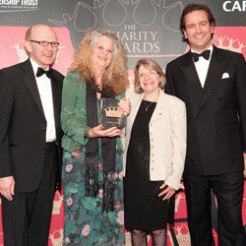Winning the Overall Award at the Charity Awards last year has helped CSV to increase by nearly five times the number of families helped by its winning Volunteers in Child Protection programme.
Sue Gwaspari, CSV’s director of part-time volunteering, who accepted the award on 8 June 2010 at the gala presentation dinner and Awards ceremony, outlined the impact that winning has had on the organisation to an audience of voluntary sector figures last week.
The event, put on by Civil Society Media and overall Awards sponsor Charities Aid Foundation, aimed to showcase some of the winning entries and offer some insight into the Awards process and tips for how to win an Award.
Gwaspari said the application process was very rigorous but provided a valuable opportunity to review and reflect on what the charity is actually achieving.
She also explained how winning gave an immediate morale boost for CSV staff, piqued the interest of various media in the project, and allayed the fears of some of the big children’s charities about the perceived riskiness of the work.
'People want to give us money'
Winning also helped in funding bids: “People want to give us money because they see this award and think their money will be safe with our organisation because we’ve been through this rigorous process.
“Towards the end of last year we had the opportunity to apply for a grant to the Department of Education to roll this project out nationally and they’ve given us two years’ funding to do that, again I think on the back of this Award. We also put in for funding for a parent mentoring scheme for families at a lower level of need than those in our Volunteers in Child Protection programme, and they’ve given us the money to roll that out in eight locations.”
Winning has also helped CSV get in front of many more local authorities to pitch the value of the project and Gwaspari said around 25 local authorities were now keen to work with the charity to develop the work. The numbers of families being helped by CSV volunteers has already climbed from 30 when the Awards application was submitted, to around 140.
Gwaspari concluded: “So we’ve got more volunteers coming to us wanting to volunteer, more local authorities wanting to work with us, and actually the longer-term results of this I hope will go on and on. I’m just very grateful that we thought to put in for an Award and I’m even more grateful that our work was recognised - the resulting publicity and profile-raising has been terrific. So I would urge everyone to have a go. The process alone is worth doing even if you don’t win.”
Click here to read Sue Gwaspari’s full speech outlining the impact of the Award on CSV.
Mencap: targets and evidence are key
Beverley Dawkins, national officer for profound and multiple learning disabilities at Mencap, which picked up the Overall Award this year, also spoke at the event and offered her top tips for winning.
She said Mencap’s challenge in filling out the form was to articulate what had been a long piece of work with different milestones in it. But what helped enormously, she said, was the fact that the campaign had “really good targets and really good evidence”.
Daniel Phelan, founder of the Charity Awards and editor-in-chief at Civil Society Media, stressed the importance of this when he opened the event. “If you want to get in the frame for one of these awards you have got to provide evidence for your claims,” he said.
Dawkins listed five key components to submitting a winning entry:
- Be brave
- Strong evidence
- Clear asks
- Timing
- Be passionate









